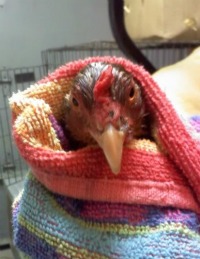Chicken Behavior Questions
One of the most important things to know about chicken behavior is that it can vary from one chicken to another. Even with a flock all the same color and breed each will have its own personality traits.
If you want to get to know your chickens and understand them check on them every day and just spend a little extra time each week watching them. Most of their behavior is perfectly natural and there is good reason for it.
Understanding their behavior can help you monitor the health of your flock. Please read all the way through this article. Near the end is important information about watching for signs of illness and disease.
Survival is a chicken’s ultimate goal. Anything that helps them survive is what they want and the root of chicken behavior. They are flock animals and naturally feel more at ease when in the company of several other chickens.
Hunger is primary and they love to eat, so much so, they spend most of the day eating. Chickens can receive adequate nutrition from processed packaged feeds but for a truly balanced diet they need access to vegetation daily.
Keeping chickens healthy and happy requires a healthy spacious environment, good food & water, shelter from extreme weather, a safe and lockable

coop with adequate roosting area for the size flock. Chickens will huddle together at night for warmth in cold weather and spread out on hot or warm summer nights.
Destructive chicken behavior will be observed in chickens kept in too small of an area with an unbalanced diet or shortage of feed.
The flock may become aggressive toward each other, fighting over food, sometimes killing and eating each other and eggs, having weakened immune systems due to stress and poor diet, pulling each others feather out to eat them, and falling prey to each other, cold temperatures, disease and parasites.
Poor quality living conditions for chickens will produce poor quality eggs and meat, chicks that cannot survive, not to mention loss of chickens, the expense of buying medications and having to replace chickens early.
If you are new to chickens, the best way to get to know them is to observe their behavior without interfering. Chicken behavior can teach you many things about your flock.
You may notice that some bully others, insisting on being first to the feeder or treats. You may notice, if you have any roosters, that some hens and roosters seem to have their favorite mates. Even some hens appear to be friends and equals in a flock while disliking others.
The structure of a healthy flock includes this “pecking order”. More dominant chickens will actually peck at less dominant chickens in order to exert their rights to eat and drink whenever they want, plus demanding their favorite roosts for the night.
Small harmless battles may be seen as they work things out among themselves. When a particular chicken looks pecked or plucked it’s time to watch, see who is doing what to whom and try to figure out why.
There’s no need to interfere with most chicken behavior unless there are injuries, including feather loss. The exception would be during the molt; feather loss is natural and to be expected.
Usually the less dominant will walk or run away but over crowded dominant chickens will attempt to force out weaker ones which can lead to serious injuries and death especially in confined areas, towards the young, old, or small.
It’s important to know that chickens are nearly, if not totally, blind at night. They know they are vulnerable and as the sun begins to set, seek a safe high place to sleep all night.
This is generally accomplished by providing roosts in a coop that can be locked up all night, keeping them in and

predators out. When introduced to their coop and kept comfortable and secure there, chickens naturally return each evening and expect to be let out in the morning.
Becoming familiar with the chicken behavior in your own flock is important to being able to spot abnormal behavior. Some chickens are loners and often spend time foraging on their own but a

sick chicken will often isolate itself and be picked on by curious flock members.
Chickens added to an existing flock may take some time or never really bond with a flock as well as chickens raised together. Knowing what’s normal for each will help you spot early signs of trouble.
Roosters may or may not become aggressive with each other. A lot depends on how many hens there are to share and how much room there is but also on the breed and temperament of each one.
Dominance or aggressiveness in roosters is a normal part of chicken behavior. If you want to raise roosters for meat it’s possible to caponize (neuter) them, preventing breeding and unwanted aggressive behavior in the flock, while improving the quality of their meat as they mature.
In-tact roosters can and might fight to the death or severe injury. Too many rosters in a flock can create a lot of stress for all members which can cause minor to serious health problems.
Chickens are very active creatures so any signs of weakness or laziness, and not keeping up as usual are worth looking into.
If you have a question you would like answered click here.
Chicken Behavior Questions
.
WHY DO CHICKENS BULLEY? 




I have two hens hat have been together once two days of age. Why is one suddenly beating up the other.
SILKIE LOST CONTROL 




My silkie started acting strange. Her head flops around and she looks like a chicken that has had it's head chopped off, flopping around.
DROOPY TAIL 




Hello,
We have some hens that are nearly at point of lay stage and they have been very healthy ever since we hatched them out. In the last couple of …
WHITE LIQUID IN MOUTH GASPING 




I found one Of my chicks sitting down with its mouth open . White liquid came out of its mouth when I picked it up . Seems to be gasping for air . Please …
ONE JERSEY GIANT DIED - ANOTHER NOT WELL 




All of our chickens look good and healthy all the sudden one day a Jersey Giant was easy to pick up and we realized that she was sick, the next day I found …
HEAD SHAKING - WHAT DOES IT MEAN? 




one of our chickens seems to be shaking its head more than normal...any ideas?
HEN PANTING 




I have 1 laying hen that is sitting in a nesting box backwards, she is panting, looks distressed. no sign of illness in any other hen.
HENS BULLYING 




I have a flock of 6 hens who have been together since they were 3 days old. Suddenly, a few days ago we noticed our Rhode Island Red being attacked by …
SLOW, EATING, GETTING WEAKER 




I have an older hen (4?)She has been acting off for at least a week ......I honestly thought she was just going to pass, but she goes to the feed everyday …
ONE LEG UP, ONE DIED 




I had 6 birds a few days ago when 1 unexpectedly died. Now another is getting sick. She is lethargic, has diarrhea and is laying strangely with 1 leg up …
SQUAWKING ALL DAY 




New behavior: squaking all day in 14X12 dirt area; they have access to food, water and their coop door is open.
HEALTHY ONE DAY - PARALYZED THE NEXT 




We have chickens that eat really good one day and the next they are paralyzed. What is causing this?
CHICKEN POSSIBLY ATTACKED 




My chicken's left eye is shut and I think it's maybe that another chicken attacked her. Above all, her beak on upper part is a bit short for some reason. …
GOING IN CIRCLES 




I have a 2 month old chick and I've had her for only a month now and she is showing weird symptoms like tilting her head back and forth on either sides …
new to chickens 




We just got our coop and are adding a run to it. Our chicks are still in the house in cage. We are new to this and questions might sound stupid, sorry. …
CAN I DO SOMETHING ABOUT BULLY HENS? 




Just this week one of my chickens, Sally, died from what I can only expect was Sudden Chicken Death Syndrome. The bad thing is that she was the ONLY one …
WHAT COULD EXPLAIN THIS ODD BEHAVIOR? 




A lady who i sold a chicken to brought the chicken back saying she was sad because the rooster died....well when I placed her on the ground she perked …
Why Is My Silkie Acting So Strange? 




Young Silkie I have had her for about 2 months. All the sudden she was acting crazy in cage. Running around making strange calking sound mouth kept open.All …
Pulled Tail Feathers Found on Dead Chicken 




My son had a chicken die. We think the rest of his chickens plucked their tail feathers out and put them on the dead one. What would be the reason for …
Chicken Fun 




How do chickens respond to their environment
My chicken is lethargic 




My hen Rosie has been acting lethargic for the last few days but it's very noticeable today and her belly seems larger than usual and she's walking like …
Chick behaving strangely 




Chick is opening mouth, then wings are flapping and her temperature is high like may be having fits. She flaps her wings walking back(wards), then sleeps …
upright chickens 




Sussex chick 6 weeks old went from walking, flying, and running normally to the next day standing up right like a penguin. No visible injuries. Does not …
social habits 




Why do some chickens peck your feet; it's like a greeting or something?
chicken eating eggs 




one or more of my chickens is punching holes in there eggs y
WHY DOES MY HEN TAKE HIGH STEPS? 



I have one chicken who pulls her legs all the way to her body when she walks, sometimes in the house which has hay on the floor & sometimes she also does …
Chicken Behavior
Not rated yet
Question
I'm raising chicks for the first time and They are still little but I haven't really been around chicks a-lot and I am not sure how they usually …

Custom Search



New! Comments
Have your say about what you just read! Leave me a comment in the box below.